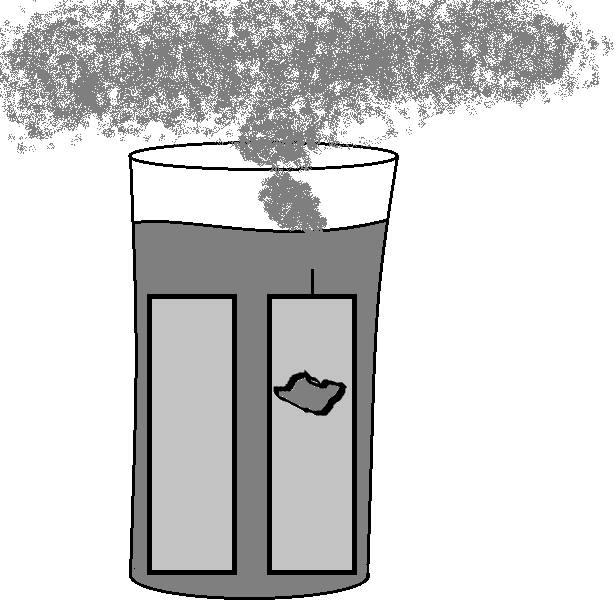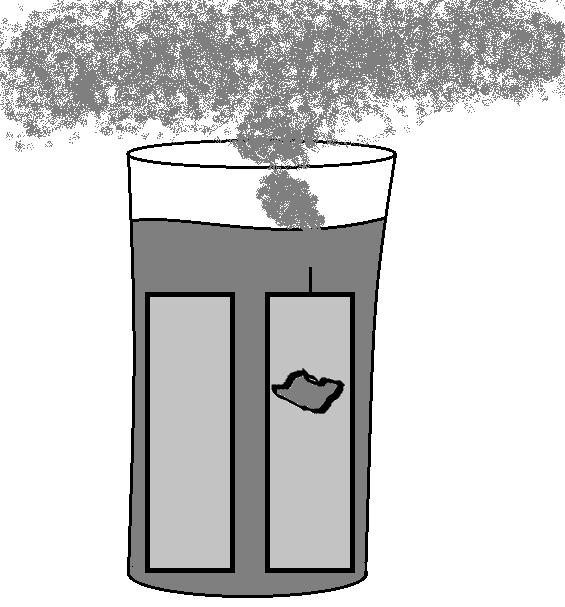
New York, New York

New York, New York
From this high one can see most of the city. It is alive in the night, the lights shimmering and streaking with the rain. Every now and then an enormous branch of lightning crawls through the dark clouds above, the flash bouncing off the skyscrapers. From behind the bar David thinks about fractals. David’s the kind of person who’s learned about fractals and now works in a bar.
The chaotic isn’t random he thinks. Or the random isn’t chaotic. Nature replicates itself on progressively smaller and smaller scales. He likes that idea. It’s kind of reassuring. Glancing around the bar that occupies most of the 25th floor, he also thinks that money can’t buy you out of loneliness. The place is dark. The windows span the entire length and height of the wall. There are only six people up there David counts. And none of them are sitting together.
David doesn’t bother busy himself drying a glass or wiping down the bar, he just stands there. These people don’t give a shit. Seeing him do work would just give them all anxiety. They’d get fidgety. What the hell does he think he’s doing? They would think. Spending too much time up here makes them paranoid. From a TV above his head comes the static-like atmosphere of a Knicks game. Porzingis drives—he goes up—oh he slams it home!
The only person sitting at the bar itself is someone David hasn’t seen before. He looks roughed up, and not in the way these people sometimes look roughed up. This was no spat with a wife or mistress. This was something serious. And this guy’s young, anyway. And not quite white David thinks. At one point they make eye contact and David walks down to him. “Another one, boss?” he asks.
The customer nods. One eye is black and swollen. There’s a cut across his nose. David won’t resist the urge. He should, but he won’t. He puts the drink down and says, “Someone got you good.” Black eye, cauliflower ears, a tasteless but expensive suit, he must be a fighter David decides. “MMA?”
“Hmm?”
“You fight MMA?”
The customer shakes his head, no. The two are quiet for a moment, as if the customer isn’t going to explain any further. Whatever, David thinks, and is about to walk away when the customer says, “Boxing.” He lifts his fists up in the boxing pose. The customer’s hands are enormous. David wonders whether you get into the sport because your hands are enormous, or if you stay in it because your hands are enormous. The guy’s not very big. In fact he’s pretty small.
David asks when and the fighter taps the bar with his index finger. “No shit. Tonight?”
The fighter nods. He knows what the bartender’s thinking, or thinks he knows. “Undercard,” he says. Not a big deal.
The boxer has some kind of accent. Thunder rumbles outside and the glasses hung above the bar rattle. David asks how it went. The boxer tells David he knocked the other guy out in the first round. Above their heads the Knicks are getting pummeled. David thinks that the only people boxing anymore are these guys, these Eastern Europeans, and Mexicans.
For a while they talk about boxing. David learns this was the boxer’s first fight in America, and while it’s not as big a deal as a fight in Vegas would have been, it is still an important step toward breaking into the American boxing scene. At one point a flash of lightning crawls through the sky. The windows absorb and stop it. Then there’s another low rumble of thunder. It’s odd, David thinks. Thunder and lightning in December, he can’t remember if that’s normal. Listening to the boxer talk about the maneuvering it took to get a fight in this country David notices that the other customers seemed to have rearranged themselves. They’re all still sitting by themselves, but in different places. And now David counts nine.
The boxer rambles on about how Americans don’t liking boxing anymore, or maybe he meant they don’t like boxers. David asks what he means. The boxer pauses. He flies back to Bosnia-Herzegovina tomorrow. America was as he expected. When he pictured America he pictured New York, and New York was as New York as he could picture. There were so many people on some of the sidewalks he and his team drove by that people were spilling into the street, most of them well dressed and obliviously lost within their phones, and then you’d make one turn and the people disappeared and all that would be left were small pieces of trash being blown around, as if you were in a place that hadn’t been populated in ten years, as if some disaster had struck. The only thing that surprised him, and he quickly realized that it shouldn’t have surprised him, was how many homeless people were lying around. He didn’t picture homeless people in New York, but they’re everywhere, in every city in every country across the world, one of the few constants across every society.
As the boxer is thinking an enormous burst of thunder shakes the windows. The two look over. The thunder shakes them so hard, in fact, that cracks form in the glass. They really are at an impressive altitude, much closer to the storm than most people.
Turning back around the boxer asks David if he’s heard of Muhammad Ali. “You know Muhammad Ali, no?” the boxer says. Of course David tells him, every American knows Muhammad Ali. “Well,” the boxer says, “Americans did not like Muhammad Ali.” He tells David that Americans didn’t like Muhammad Ali after he claimed his faith was the reason he objected to the Vietnam War. And it was true the boxer tells David. Muslims are not allowed to fight unless in self-defense or in defense of other persecuted Muslims. Americans are not fighters like that, which is why the best boxers have always been villains to Americans, because it is inherent in the style of boxing that you cannot attack without being attacked. That’s why there’s so much dancing in boxing, the boxer tells David, but it’s necessary. Boxers who go on the offensive never last.
David didn’t really catch what the boxer was saying. Instead he’s looking at the cracked windows, thinking that they might be a problem. “Yeah,” he says absently. That’s all he musters. Some of the rich guys relocate to seats away from the windows.
The boxer nods. He knows he’s not being listened to. Americans are getting further and further away from the boxing style of fighting. The champions’ lists are full of Mexicans and Russians and Kazakhstanis now and Americans have moved on to the blood sport that is the MMA. He knows if he were to make it big they would never understand him. They wouldn’t understand his fighting, or the way he moves around the ring, or the way he throws his fists, or the way he talks. They wouldn’t know what it all means, but who cares, really? So long as he doesn’t care, it can be humorous, and if it’s humorous, maybe it can be freeing. What else can he do but keep talking?
So he talks about war. He talks about the Bosnian War. He mentions names like Karadžić and Milošević, about monsters that continue to haunt that country and region, about how you can still find their ghosts around the corner or in the windows of abandoned apartment blocks or in old cafés or in basement fight clubs under a bare light bulb. He talks about the death of his father. He talks about the killing of Muslims. He talks about how everyone he knows, every family member of his, was born a fighter. He talks about how Americans aren’t born fighters anymore. They’re not born fighters and that’s why they’re the most willing to fight. That’s the most dangerous kind of fighter the boxer says, the one who has been convinced to. At one point in all this talking another flash of lightning traces across the sky and, meeting the windows, blows them out, scattering glass all over the floor.
“Jesus!” David says. The rain starts pouring in. Glass is everywhere, though some of it is being sucked out into the sky. He also doesn’t know what the boxer is talking about. He doesn’t know how they got on this subject.
But the boxer keeps talking, apparently unconcerned by the force of the storm. He’s trying to make a point, something about how no one really wants to fight anymore, and that’s why he boxes, which doesn’t make sense to David, but also something about in the end you have to decide if it’s worth it, if you’re really doing anything by not fighting by boxing. The question he often asks himself is whether Muhammad Ali won. Looking at the way the end of his life went, with the Parkinson’s and everything, could you convincingly say that Muhammad Ali won, and that in his fight against the society he lived in he didn’t actually lose, and lose devastatingly? To put it simply it’s that all encompassing question: was it worth it?
David always tells himself not to do this. Never talk to the customers. He just keeps nodding, watching the rain fly in through the broken windows. It almost looks like the black storm clouds are starting to drift inside, too. It’s always shit like this, something serious, and what the hell does he know? What could he possible say to something like this? In fact, he realizes, the clouds are coming in through the busted windows. Jesus, David thinks, this is some storm.
The boxer had knocked out the other fighter about two minutes into the first round. He had come out fast and everything he threw connected. The other kid was out of shape. It was as simple as that. At this level, being in shape can take you far. It only starts to get more complicated near the very top, though really not much more. But this kid was out of shape, and the boxer connected a one-two when the arms dropped and the kid fell over and that was it. But who knows if he’ll ever have the chance to fight in America again. That’s just not how things work.
Rain is now falling from the clouds that have made their way inside. David is scrambling to dry the bar. He has no idea what they’re talking about anymore. The boxer is saying something about winning, about how he believes he’s going to win, which David thought he already did. He keeps mentioning winning, winning as if he’s talking about something other than boxing. The old rich guys have retreated to the bar. The boxer is looking down at his glass that’s filling up with rain. David gives up trying to dry the bar. “Another one, boss?” he asks before walking off to see if the old guys want anything. Inside thunder rumbles, strangely.